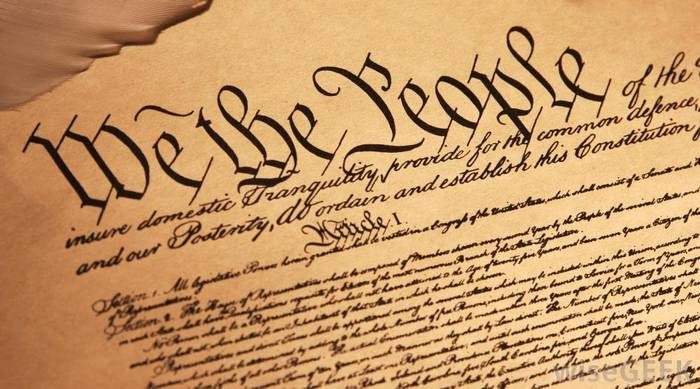Why we need a constitutional amendment on environmental sustainability
The United States has a Bill of Rights in its Constitution guaranteeing several freedoms around religion, speech, the press, bearing arms, search and seizure, speedy trials, and a few others. Imagine you woke up to headlines that for some technicality no one had noticed for over two centuries, the Bill of Rights had been improperly processed and turned out it was invalid.
That is, imagine the Bill of Rights didn’t exist. The government could write laws limiting religion, speech, the press, bearing arms, and so on far more than before. People and corporations with power would see a sudden opportunity to gain power by encroaching on rights you thought you had. The government could take over the media and churches. It could stop you from speaking and gathering with friends. It could take away your right to defend yourself and your home with weapons.

What would you do? I don’t know about you, but I’d consider it one of my top priorities to validate that bill of rights. Every moment lost is a moment powerful interests would find ways to keep it invalid. They would figure out sugar-sweet ways of saying how limiting free speech and so on actually benefit all of us. “By streamlining our message with less dissent,” they might say, “we can speak with a stronger voice.” They’d go scary too: “If we don’t do it, China and Russia will, and they’ll beat us in the market or militarily. It’s for our safety and security.”
I don’t know about you, but I could imagine these interests winning—that is, preventing the Bill of Rights being reinstated, or at least watering down parts of it, leading us to enjoy fewer rights than we thought we had.
The Bill of Rights is secure, so we don’t have to worry about it, but do you believe we have rights to a clean environment? I was speaking to podcast guest Maya van Rossum, who works on passing amendments protecting clear air, land, water, food, and environment. She pointed out most of us believe we have such rights. We don’t, except, so far, in the three states that passed what she calls Green Amendments, though even there, since pollution crosses political boundaries, we don’t fully.
The framers of the Constitution and Bill of Rights couldn’t have imagined humanity poisoning our air, land, water, food, and environment as we have, or heating the planet, so we can understand why they didn’t include something about it. They did intend to protect you from my destroying your life, liberty, property, and pursuit of happiness, which pollution does.
Though I’m glad I don’t have to compare which rights in the Bill of Rights I value more since I enjoy them all, I wonder how much I’d value each if I had to choose among them and included rights to clean environments among them. It’s hard not to conclude I’d value clean air, land, water, and food over other ones. In other words, I can’t help but conclude that the right to a clean, biodiverse, sustainable environment could be the most important of all. It might not have been in the over two centuries our pollution has taken to fill Earth’s huge reserves, when some pollution wouldn’t kill people, but we’ve filled those reserves.
When I first thought of a constitutional amendment banning pollution, it seemed crazy, pie-in-the-sky, too difficult, and not necessarily effective. The more I learn about it, the more important I see it, especially in conversations with Maya and other podcast guests who are experts in constitutional law, environmental law, and passing amendments, especially the Thirteenth. Until we pass such amendments in states and nationally, the job of becoming sustainable isn’t done. Without the Thirteenth Amendment, the Civil War could have ended only for slavery, still legal, to reestablish itself. That’s why Abraham Lincoln considered it necessary. Imagine: slavery could still exist had they not passed that amendment. Likewise, without an amendment for a sustainable environment, we could see the nature we need to live and breath degrade to where large portions of Americans die annually, as much as people in other nations already do (often through industries Americans pay for). Passing an amendment wouldn’t finish the job: it’s necessary though not sufficient. Passing it would require overwhelming public support, which means changing our culture, which requires leadership, which is why I work on sustainability leadership.
Just as protecting speech, press, religion, and so on doesn’t make us weaker or less secure, but stronger and more secure, so would protecting the environment. It would spur innovation, level markets for innovators to solve problems, and benefit us all. It would protect your life, liberty, property, and pursuit of happiness from my destroying them.
Back to the hypothetical case of the Bill of Rights being found invalid, I’m afraid the majority of Americans would respond with messages like “Restoring the Bill of Rights is important, but I have kids to put through college, a mortgage, and other priorities right now so can’t work on it. I have faith people smarter than me will take care of it. What I do doesn’t matter anyway” and such.
If you wouldn’t tolerate losing the Bill of Rights and you consider clean air, land, water, and food, and a sustainable environment comparably valuable to other rights, then you see the importance of amendments protecting them. It seems we need some patriots to strengthen this country.
Read my weekly newsletter

On initiative, leadership, the environment, and burpees